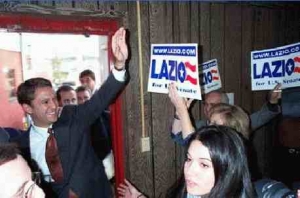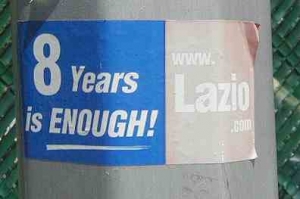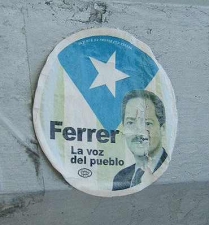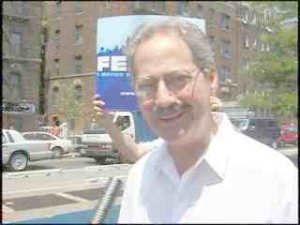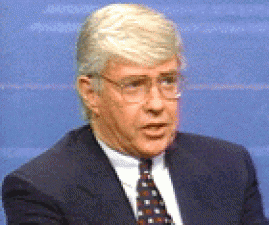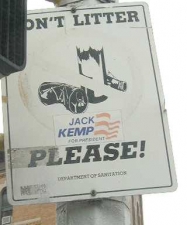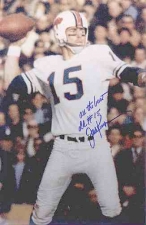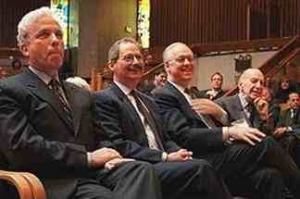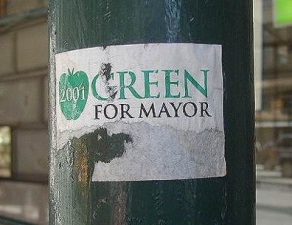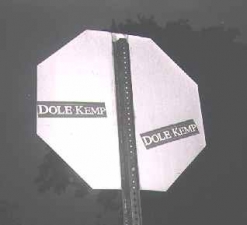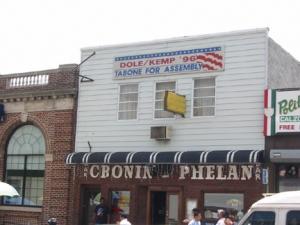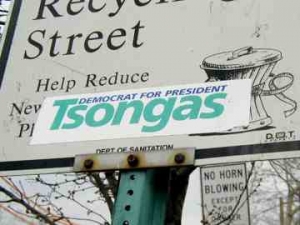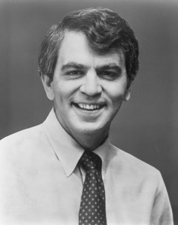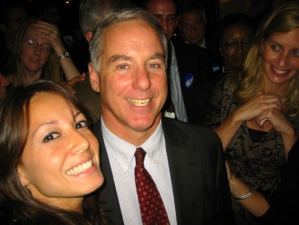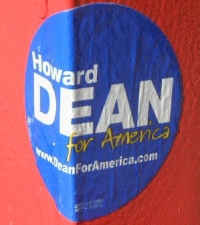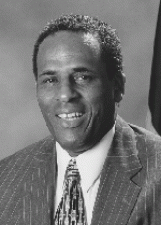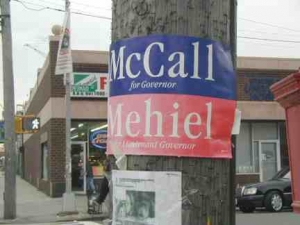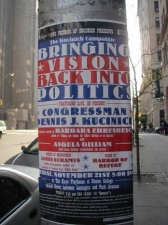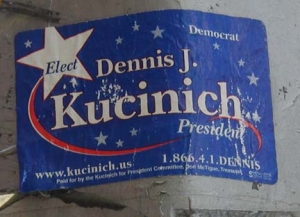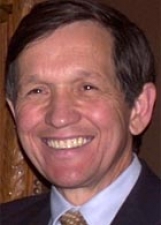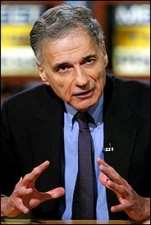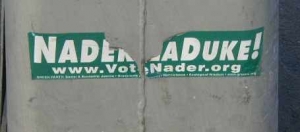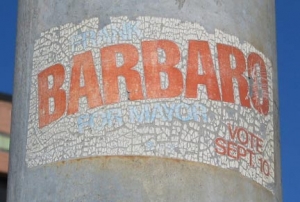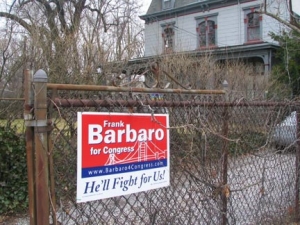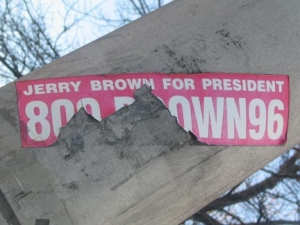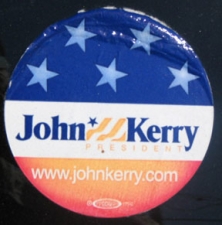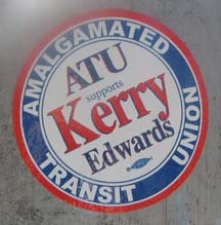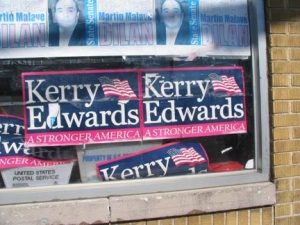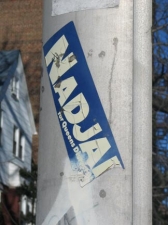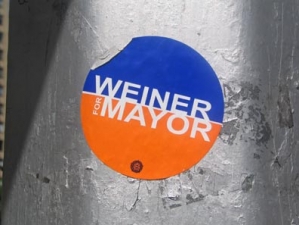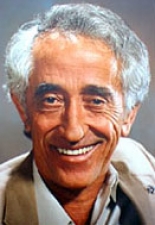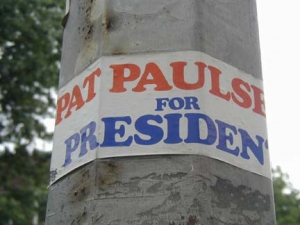The streets of New York bear continued witness to the many failed political campaigns of years past. Though they’ve lost, they live to challenge another day. And, their campaign signage is still there just in case they do! On this Forgotten NY page, we’ll see just a few.
Rick Lazio waves to supporters during his 2000 campaign for United States Senate. Lazio, the Republican candidate, had had his eyes on the Senate seat early in the campaign, but stood aside in favor of the charismatic NYC Mayor Rudolph Giuliani, who had had seven mostly successful years in that office. Giuliani, however, never got around to declaring his candidacy, and when he was stricken with prostate cancer that necessitated months of difficult treatment, Lazio, a four-term congressman from Suffolk County, Long Island, was tabbed as the candidate and opposed Democratic candidate Hillary Rodham Clinton.
Lazio trailed through much of the race, and many political observers say he stumbled during a televised debate when he strode across to Clinton’s lectern and asked her to sign a pledge not to use so-called ‘soft money’ contributions. The ploy was seen as too theatrically confrontational. In the end, Clinton defeated Lazio by a 56-44% margin.
Found at: Sanford Avenue, Fidlushing
Lazio’s campaign played to possible voter ambivalence toward Bill Clinton, who was completing eight years in office in 2000, in his campaign against Hillary Clinton.
Found: Campus Road, Flatbush
Using the Puerto Rican flag as a backdrop in this campaign sticker, Fernando Ferrer called upon Latino voters, and especially voters of Puerto Rican heritage, to help him into a seat in Gracie Mansion.
For a brief while in the fall of 2001, it looked like long-time Bronx Borough President Fernando Ferrer had a shot at Gracie Mansion. Ferrer had emerged with a slight lead over Mark Green (see below) in the Democratic primary, and the two faced off in a rancorous runoff. This time, Mark Green was the victor and went on to face billionaire Michael Bloombergin the general election.
2005: Ferrer was the frontrunner in the early polling in the 2005 NYC mayoral race.
Found: 5th Avenue and Bay Ridge Parkway, Bay Ridge, Brooklyn
Jack Kemp passes the Buffalo Billsto the AFL championship in 1964. The Bills would repeat in 1965; Kemp would helm the Bills through the 1969 season.
Though Jack Kemp represented his Buffalo, New York region in the House of Representatives from 1971 to 1989, he didn’t have quite the same success in national politics that a previous similarly-thatched, quick-witted Jack had had in 1960. Still, Jack Kemp has been a formidable presence on the political scene for years. Originally elected as a right-wing conservative, by the time he sought the Republican presidential candidacy in 1988, his views had evolved to the point where he was thought of as a Republican that labor unions and college campuses could, if not love, at least abide. Kemp was beaten by George H.W. Bush for the nomination in 1988…but it would not be his last bow on the national electoral stage.
Jack Kemp is co-director of Empower America, a public policy and advocacy organization he founded in 1993 with Dr. William Bennett and former U.N. Ambassador Jeane Kirkpatrick.
Returning to New York City politics…
Mark Green,left, appears with other Democratic NYC mayoral candidates, Fernando Ferrer, Alan Hevesi and George Spitz early in 2001.
It seems as if Mark Green is permanently running for office…he has been in public service for over thirty years, first as Ralph Nader‘s chief ‘raider’ in Washington between 1970 and 1980. He made corporate accountability and consumer affairs his specialty and has written dozens of books on the subject, and has made regular television appearances, notably on CNN’s Crossfire and presently on NY1 with former NYC Mayor Ed Koch and Senator Al D’Amato, who defeated Green in the 1986 New York senatorial race. In 1993 Green became NYC’s first Public Advocate and won the office a second time in 1997. He was defeated in 2001 in a close contest for NYC Mayor by Republican Michael Bloomberg after squeaking past Fernando Ferrer (see above) in a Democratic runoff.
Found: 7th Avenue and West 25th Street, Manhattan
Would candidate Mark Green choose any other color but green for campaign literature?
Bob Dole during World War II
Found: 39th Road and Nassau Ro
ad in Little Neck, Queens
Astoria
There has been either a Bush or a Dole on every Republican presidential ticket since 1976…a streak that has reached seven elections. Senator Robert Doleof Kansas ran for Vice President in 1976, and 20 years later he ran at the top of the ticket with Jack Kemp (see above) as his running mate.
With the country still riding the 1990s tech boom, Dole and Kemp, who together were over 130 years of age, couldn’t mount much of a challenge to Democratic incumbents Bill Clinton and Al Gore.
Sen. Paul Tsongas (1941-1997)
Found: 10th Avenue and 65th Street, Dyker Heights, Brooklyn
Sen. Tsongas takes a call before another day of campaigning in early 1992
With the notable exception of Harry Truman, it seems as if straight shooters don’t fare well in presidential politics. Paul Tsongas, Senator from Massachusetts between 1979 and 1985, offered up frank solutions to an economic malaise the country was in in 1992. Tsongas captured the New Hampshire primary, but his campaign stalled due to limited funding and Bill Clinton soon took the Democratic lead. Tsongas suffered from ill health even during his campaign. He later suffered from lymphoma and died of pneumonia in 1997. Speaking of straight shooters…
From andreaharner.com
found: Williamsburg Bridge
For a few months in late 2003 and early 2004, it appeared as if ex-Vermont Governor Howard Dean might be the standard bearer for the Democratic Party against President George W. Bush in the general 2004 election. Dean, a medical doctor, stated he was from “the Democratic wing of the Democratic Party” and voiced total opposition to the invasion of Iraq. He led most polls taken before the Iowa caucus, traditionally the first skirmish in a presidential race, but after stumbling and losing the caucus to Massachusetts Senator John Kerry, he lost momentum and ceded the race to Kerry later in the spring. Dean was again a frontrunner in early 2005…this time in the race for Chairman of the Democratic Party.
Ex-New York State Comptroller Carl McCall opposed George Pataki in the New York gubernatorial race in 2002. Running on a platform based on education issues and fiscal responsibility, McCall was unable to make much of an impact at the polls against the incumbent.
Mermaid Avenue and West 17th St., Coney Island
U.S. Rep. Dennis J. Kucinich of Ohio mounted a mostly unsuccessful campaign for the Democratic Presidential nomination in 2004, finishing near the bottom in most primaries.
Nevertheless, unlike other Democrats, he kept his name on the ballot all through the race and did not concede until he officially lost to Senator John Kerry when the delegate count was tallied at the Democratic Convention in Boston, Mass. in July 2004.
Veteran consumer advocate and corporate watchdog Ralph Nader mounted an independent campaign for President in both 2000 and 2004. It was thought that votes for Nader cost Vice-President Al Gore the White House in the 2000 race, decided by a few hundred votes in Florida; Nader’s impact was less felt in 2004.
Of all the candidates running in 2004, Abe Hirschfeld has been around the longest; in fact, the Tarnow, Poland, native’s first run for public office came in 1959. The real estate developer has been involved in four campaigns over the years, including a 1997 run for Manhattan borough president and another for the US Senate in 2004 (won by incumbent Chuck Schumer in a walk). Hirschfeld has been on trial for tax evasion and has also been accused of hiring a hit man to whack a business partner. In 1993 he maneuvered himself into New York Post ownership for 18 days; the paper’s staff put out “mutiny editions” with blaring headlines like “Who Is This Nut?”
Attorney Frank Barbaro opposed Mayor Ed Koch in the 1985 mayoral primary. (Bruckner Blvd. and Westechester Avenue, Pelham Bay Park)
Barbaro ran for Congress in 2004, and lost again.
Freddy Ferrer gave it another try in 2005 for mayor and won the Democratic nomination, but was swamped by Mayor Mike Bloomberg.
Jerry Brown, a California governor in the 1990s, has run for President repeatedly. (69th Street, Maspeth)
Massachusetts junior senator John Kerry bested Dean in the 2004 Democratic primaries, but could not wrest the White House from George W. Bush.
This is likely a campaign sticker for Maurice Nadjari, a 1970s corruption-fighting prosecutor.
Brooklyn/Queens congressman Anthony Weiner was defeated in the Democratic mayoral primary by Freddy Ferrer in 2005.
Bowne Street, Flushing
Emmy-winning comedian Layton “Pat” Paulsen (1927-1997) first declared his intention to run for President in 1968 on the Smothers Brothers Comedy Hour… and would “run” four more times under the Straight Talking American Government (STAG) Party. Paulsen would often try to make serious points all the while couching them in comedic barbs.
“I’ve upped my standards..now up yours.”

